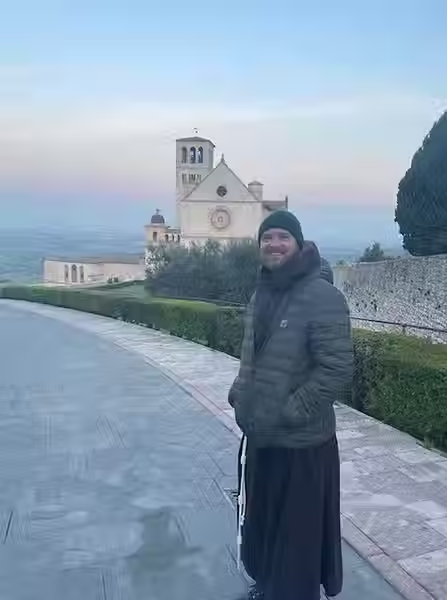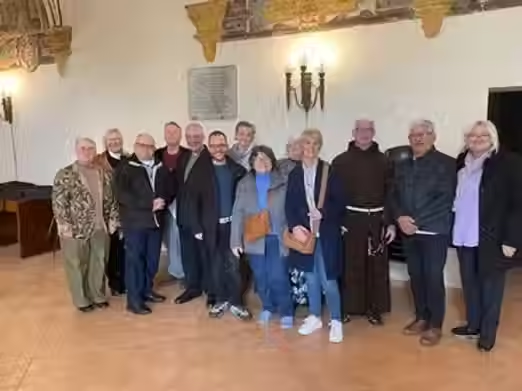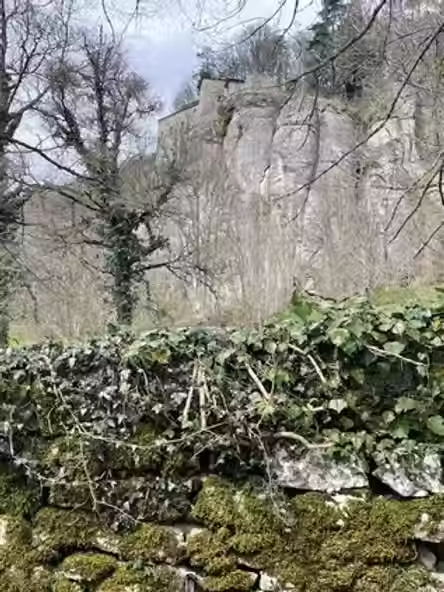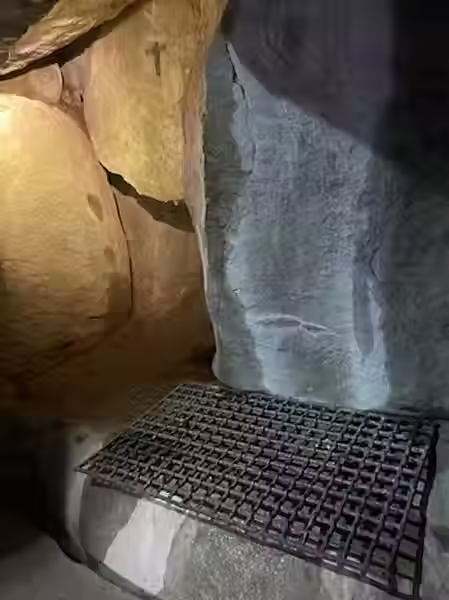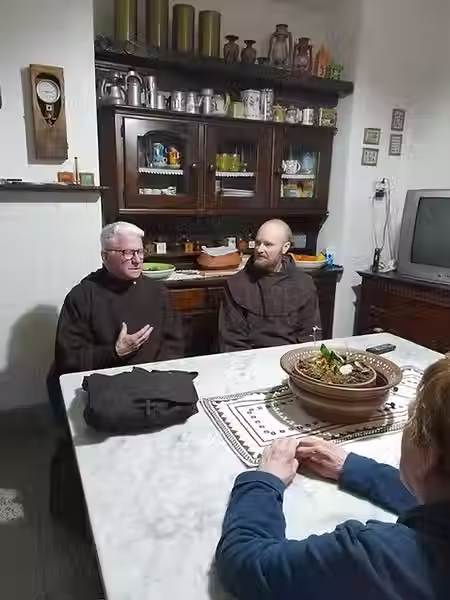
Pilgrimage to La Verna: Following the footsteps of St. Francis to the Cross
A traditional pilgrimage is the process of following in the footsteps of others toward the Divine, a process that requires emptying oneself in order to follow the directions of the Holy Spirit. This is how I describe my journey to the remote Sanctuary of La Verna in the Apennine Mountains at the end of Lent 2024. The previous year I had visited briefly, long enough to feel the power of that sacred mountain, “the Franciscan Gethsemane.” Since that first visit I felt called to return.
Eight hundred years ago St. Francis travelled to this remote spot, searching for solitude to complement his profound need to understand the suffering and the immense love of his beloved Saviour. He prayed for 40 days before receiving the marks of Crucifixion on his own body. I resolved to honour the 800th anniversary of this occasion by ending my own 40-day Lenten practice at the Sanctuary of La Verna.
In August 2023, as I began the logistics for the trip, I knew that I wanted to do a pilgrimage in proxy for my beloved Franciscan brothers and for those who needed special help from our Saviour. In short, I decided to become a “prayer mule,” that is, a pack animal carrying the prayers of others rather than my own burden. In true Franciscan style, I would embark on this journey by erasing myself through service.
With the permission and blessing of the Order, I set out a few days before Holy Week in March 2024 carrying a medium-sized backpack and a classic, Franciscan satchel slung over my shoulder. I set out with a small book of prayers containing submissions from my brothers and from friends of all beliefs. My intention was to carry this handbound book at all times. Indeed, the volume became part of me during those two weeks.
In addition to prayers submitted by others, I composed prayers for my parish and for the Indigenous people who have cared for land where I live and worship. And with that prayer, I carried a Cross fashioned by an Indigenous artist. I was laden with a great and powerful task that would require deep humility and contemplation in the days ahead.
I arrived in Assisi where I stayed for the three days before Holy Week. That first night I met Brother Hawk, a Franciscan brother who lives and serves in a small village in southern Tuscany. Upon meeting, we were blessed with a strong fraternal bond and, as a result, we spent the subsequent two days in prayer and in deep, spiritual communion. What a beautiful honour it was to share “prayer mule” responsibilities with him, kneeling side by side before the Cross of San Damiano and behind the tomb of our beloved, Seraphic Father!
On Palm Sunday immediately after Brother Hawk’s departure, rather than participate in the grand procession and mass at the large basilica, I decided to represent my Order and my country at Saint Leonard’s Church together with the local Anglicans of Assisi. The ancient church appeared to have been constructed in tribute St. Francis’ experience at La Verna. The walls were decorated with ornate frescoes of scenes from his life, culminating in images of his sacred encounter with the Divine.
Upon arrival on Palm Sunday, I was welcomed warmly. “You are a Franciscan Friar from Canada?” asked the pastor. “We have not had a friar from Canada in a long time. Welcome!” Like the walls surrounding the close-knit group, the pastor’s homily was all about the saint, a profound mix of Anglican and Franciscan spirituality. A perfect prelude to the week ahead.
Early Monday morning, I set out for La Verna, a slow voyage into the Apennine Mountains in Tuscany. Upon arrival the resident friars were curious to know where I came from and inquired about my “prayer mule” task. “When the pilgrims arrive, it may become difficult to find solitude,” counselled a resident friar. “Please let us know if you need anything.”
Each day, however, I always found a new spot to offer the prayers that I carried. One day, knelt beside the rough rock that St. Francis used as a bed. On the subsequent day, I found a spot out of the rain on the Sasso Spicco (“the rock that juts out”) where St. Francis often retired to pray. Even as the pilgrims began to arrive later in the week, I was blessed with a private spot to offer prayers. Friday evening, however, after the Triduum had commenced in earnest, I found it more and more difficult to find seclusion. In a miraculous gesture that night, I received a text message from my Franciscan brother in southern Tuscany. “Why don’t you come to my Castell’Azzara tomorrow for a few days. I want you to experience this village. Is it OK if I pick you up tomorrow evening?”
I knew when I surrendered myself to God at La Verna earlier in the week, I was figuratively throwing away my carefully planned itinerary. “Indeed,” I reasoned, “isn’t that really what a pilgrimage is all about, learning to trust in God to lead the way?”
At the remote village of Castell’Azzara beside my Franciscan brother, I was introduced to the generous and warm people of the village. I met his compassionate companion, Morgan. I met the amicable priest of the village. I met the animals, including Brother Hawk’s massive Tuscan dog, a Maremmano breed. Brother Hawk is a healer with a profound background in Western and Chinese Medicine. It was my honour to have stood beside him as he ministered with great compassion to the seniors in the village. I would offer the prayer in Italian while he used his healing touch. The people of the village had warmly embraced both Brother Hawk and his companion, Morgan, and I felt honoured to support them in their service. Life is simple and uncomplicated in Castell’ Azzara, a way of life that reminded me of my own first years in Italy fifty years ago. A wonderfully slow pace.
Early Monday morning, I set out for La Verna, a slow voyage into the Apennine Mountains in Tuscany. Upon arrival the resident friars were curious to know where I came from and inquired about my “prayer mule” task. “When the pilgrims arrive, it may become difficult to find solitude,” counselled a resident friar. “Please let us know if you need anything.”
Each day, however, I always found a new spot to offer the prayers that I carried. One day, knelt beside the rough rock that St. Francis used as a bed. On the subsequent day, I found a spot out of the rain on the Sasso Spicco (“the rock that juts out”) where St. Francis often retired to pray. Even as the pilgrims began to arrive later in the week, I was blessed with a private spot to offer prayers. Friday evening, however, after the Triduum had commenced in earnest, I found it more and more difficult to find seclusion. In a miraculous gesture that night, I received a text message from my Franciscan brother in southern Tuscany. “Why don’t you come to my Castell’Azzara tomorrow for a few days. I want you to experience this village. Is it OK if I pick you up tomorrow evening?”
I knew when I surrendered myself to God at La Verna earlier in the week, I was figuratively throwing away my carefully planned itinerary. “Indeed,” I reasoned, “isn’t that really what a pilgrimage is all about, learning to trust in God to lead the way?”
At the remote village of Castell’Azzara beside my Franciscan brother, I was introduced to the generous and warm people of the village. I met his compassionate companion, Morgan. I met the amicable priest of the village. I met the animals, including Brother Hawk’s massive Tuscan dog, a Maremmano breed. Brother Hawk is a healer with a profound background in Western and Chinese Medicine. It was my honour to have stood beside him as he ministered with great compassion to the seniors in the village. I would offer the prayer in Italian while he used his healing touch. The people of the village had warmly embraced both Brother Hawk and his companion, Morgan, and I felt honoured to support them in their service. Life is simple and uncomplicated in Castell’ Azzara, a way of life that reminded me of my own first years in Italy fifty years ago. A wonderfully slow pace.
The last day in the Village, I was asked, “Fra Ugo, when are you coming back?” A question posed quite a few times during my three-day visit. To which I responded, “I do not have an exact date, but I know I will be back in the coming year.” Brother Hawk nodded his head in the affirmative. “I promise I will be back,” I said.
I have been home now for four days in the small apartment here in the West End of Vancouver and I feel so blessed. I have been blessed by the many people who prayed for me along this pilgrimage. No longer my pilgrimage, it had become their pilgrimage, too. I was led to the sacred mount of La Verna and then I was led beyond, to that blessed place of compassionate service and peace.
Il Signore ci dia la pace! May the Lord grant us peace!.
